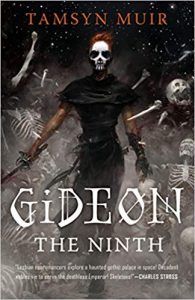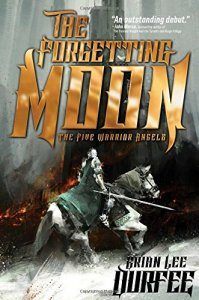Liz Bourke and Carolyn Cushman Review Gideon the Ninth by Tamsyn Muir
 Gideon the Ninth, Tamsyn Muir (Tor.com Publishing 978-1-250-31319-5, $25.99, 448pp, hc) September 2019. Cover by Tommy Arnold.
Gideon the Ninth, Tamsyn Muir (Tor.com Publishing 978-1-250-31319-5, $25.99, 448pp, hc) September 2019. Cover by Tommy Arnold.
Gideon the Ninth, debut novel by much-hyped new voice Tamsyn Muir, is a book that spent several months on my shelf while I wrestled with my mixed feelings about how very hyped it has been since I first heard of it. Lesbian necromancers in space! Gothic cutthroat politics! Epic shit! You’ll love this, a number of people told me, and I grew more and more averse to opening its cover.
First novels almost never live up to their publicity. (I can think of a bare handful that came close.) Gideon the Ninth doesn’t, either: it’s not a piercing revelation or the perfection of the form. What it is – well. It’s an interesting novel with some seriously batshit worldbuilding and a strong, compelling voice. It’s also a novel that’s about a deeply unhealthy central relationship, one that left me exquisitely uncomfortable with its ultimate trajectory, and a story that doesn’t do quite enough work to earn the ending of its emotional arc. Gideon the Ninth knows its central interpersonal relationship is seriously fucked up. The ending makes me question whether the book understands how much and in which specific ways that relationship is fucked up, the adversarial abusiveness and weird co-dependence of it all. And because much of the novel is a breezy, punchy, irreverent, gothic necromantic adventure (in space!), the impact of the weird squickiness is dispersed until the very closing pages.
Gideon Nav is the eponymous protagonist of Gideon the Ninth. Gideon belongs – literally belongs, in a version of indenture – to the Ninth House, last, weirdest, and creepiest of the nine great houses of an interstellar empire (ruled by an Undying Emperor) which runs on necromancy. Gideon has been trying to leave the Ninth House for years and enlist in the military. (Gideon is a well-trained swordswoman with a taste for tasteless porn.) She is also only one of two living people under the age of 20 in the Ninth House: the other is Reverend Daughter Harrowhark Nonagesimus, the heir to the house, who’s been secretly necromantically puppeteering her dead parents for several years. Harrow has been making Gideon’s life a misery since their infancy. But an opportunity arises for Harrow to become one of the Emperor’s Lyctors, when she is invited along with other necromantic heirs of houses to participate in a process that might lead to them ascending to this high – indeed, near god-like – position. For this, she needs an official cavalier. The only possible candidate for the position is Gideon. No one is happy with this, least of all Gideon.
The First House they go to for Harrow to try to become a Lyctor is a once-great but now largely decayed site, inhabited only by skeletal servitors and three very strange priests. Gideon, unwillingly yoked to Harrow, navigates her relationships with the other Lyctor candidates uneasily. Though her adversarial relationship with Harrow is eventually mitigated by their need to work together – and at least one relatively honest angry conversation – she develops relationships and loyalties to other people in the peculiar hothouse environment she finds herself in, in a house full of locked doors and bizarre secrets.
It’s been said that the gothic novel involves a woman, a complicated house, and murder. (The gothic horror novel as “girl meets house, house and/or its inhabitants try to kill girl.”) On that basis, Gideon the Ninth is very definitely a work of gothic speculative fiction, one, moreover, with a deeply goth sensibility. The worldbuilding is delightfully batshit, revelling in its own gothic creations; complex, whimsically allusive. Gideon’s voice is compelling, breezy and irreverent, and possessed of self-aware humour. The deep sense of irreverence means that tonally, despite its claustrophobic setting, psychological manipulation and betrayals, and the mounting death toll, Gideon the Ninth never exactly feels like horror. Only in its showdown between godlike powers at the conclusion does horror’s inescapable tragedy become part of the narrative’s primary argument – and it is here, I feel, that the narrative fails in its interrogation of the central hate-co-dependence-need relationship between Gideon and Harrow, and leaves me feeling very uncomfortable indeed.
Not at all in the ways I think the novel intends me to be uncomfortable.
This is an ambitious first novel. Whether or not its reach exceeds its grasp, I suspect, lies in its sequels (Harrow the Ninth, coming next year, and Alecto the Ninth, coming later) to confirm or deny. But I’ll most likely be reading Harrow the Ninth, because Gideon, for all its flaws, was a very enjoyable read.
-Liz Bourke
[This review and more like it in the October 2019 issue of Locus.]
One of the most irreverent characters I’ve encountered in a long time, Gideon Nav wants only to escape the House of the Ninth, a dark place populated by the dead and the few living necromancers that control them. Gideon, no necromancer but an enthusiastic swordswoman, keeps trying to escape and join the military Cohort, but her plans are continually foiled. Then she’s offered something new – if she accompanies the Lady of the Ninth House, the much-loathed necromancer Harrowhark, on a mission. The Emperor, the King Undying, has called for each house to send their first (Harrowhark) and their cavalier to be tested as potential Lyctors. The problem is the Ninth’s cavalier is unwilling, so Harrowhark drafts Gideon, and the two are off to another world where they end up in an incomprehensible contest against the other eight houses in a decaying, mazelike complex. Foul-mouthed Gideon is a joy to watch as she attempts to pass as a cavalier, falls for one of the competition, and basically spends a hell of a lot of time trying to figure out what’s going on – gradually learning to work with Harrowhark, and maybe even coming to appreciate her. Other characters aren’t always as well delineated, which adds to the confusion at times. This universe is fascinating and the story intense; much remains frustratingly obscure, but intriguingly so. I was seriously starting to question how an empire this decayed could possibly survive, but somehow it all manages to be truly compelling fun. Muir’s impressive first novel offers a heady and macabre mix of science, necromancy, constant danger, and a healthy dollop of Gormenghast-like weirdness like no other.
-Carolyn Cushman
Liz Bourke is a cranky queer person who reads books. She holds a Ph.D in Classics from Trinity College, Dublin. Her first book, Sleeping With Monsters, a collection of reviews and criticism, is out now from Aqueduct Press. Find her at her blog, her Patreon, or Twitter. She supports the work of the Irish Refugee Council and the Abortion Rights Campaign.
Carolyn F. Cushman, Senior Editor, has worked for Locus since 1985, the longest of any of the current staff, and handles our in-house books database, writes our New and Notable section, and does the monthly Books Received column. She is a graduate of Western Washington University with a degree in English. She published a fantasy novel, Witch and Wombat, in 1994.
 While you are here, please take a moment to support Locus with a one-time or recurring donation. We rely on reader donations to keep the magazine and site going, and would like to keep the site paywall free, but WE NEED YOUR FINANCIAL SUPPORT to continue quality coverage of the science fiction and fantasy field.
While you are here, please take a moment to support Locus with a one-time or recurring donation. We rely on reader donations to keep the magazine and site going, and would like to keep the site paywall free, but WE NEED YOUR FINANCIAL SUPPORT to continue quality coverage of the science fiction and fantasy field.









I highly recommend the audiobook version. Moira Quirk’s voices for each of the characters were spot on, and she fills the reading with the perfect level of sarcasm that the story requires. She takes a very good novel and makes it brilliant.
Liz: Yes. I absolutely agree with you on the “the adversarial abusiveness and weird co-dependence of it all.” Given the buzz as a book with a ‘lesbian necromancer’ (not absolutely true, to our knowledge), I did like the way it played around with sexual identity. I halfway expected it to go in other directions; in this, Gideon felt very new in her exploration of her sexuality (which only makes sense, given a lack of age-mates), but the interactions with Harrow were so dysfunctional and child-ish that it felt squicky. And that ‘lesbian’ is part of it’s buzz? Like the only great book we can come up with with same-sex female attraction is fucked up and has a (spoiler) end?
I disagree with almost everything in this comment. Like, it is pretty obvious that both Gideon and Harrow are only attracted to people their own gender, so questioning the “lesbian in space” sloagan isn’t really fair, concidering this is a fantasy world where both labels and homophobia doesn’t seem to exist. As for the Harrow/Gideon dynamic: Sure, they are dysfunctional (not child-ish. Their banter and interactions aren’t that different from other relationships potrayed in media) but the book is not saying they are some perfect couple or that their dynamic is healthy by any means. As soon as they have their confrontation they both work on getting better. Also, this is a fantasy world that is so far removed from any modern world that expecting things that are wrong in the real world also are just as wrong in this fantasy world seems strange to me.
Also, always potraying healthy, happy go lucky same sex dynamics with a happy ending to their story when hetero stories had so much more dynamics explored seems boring to me. I get the frustration with how this story in potrayed in reviews, because
I personally feel like the way the Harrow/Gideon dynamic is judged here is by using a modern lense and ignoring the world in which the dynamic exists in. On the one hand, you can’t deny that media of all kind can have an impact on its consumers, so questioning abusive and/or toxic relationships is a good way to not let people think they are somehow the norm or desirable. On the other hand, this is a fantasy book set in a world very different from ours. It has different rules, different cutture, a different relationship with violence and death. Expecting interpersonal relationships to work the same way as they do in the real world is kind of naive imo. I really like that the author understood that
Totally agree with the previous comments from Dreaner.
*Spoilers – Do not read below if you have still not read that awesome book*
They are lesbians but they have everything set against an ‘healthy’ relation: social hierarchy, the fact than Gideon is basically spurned by nearly everyone in their messed up society, and the wee fact than they have tried to kill her several times since she was a baby.
I am happy than the author did not fall in the easy trap of they are queer and even if it’s a fantasy/SF book let’s do as if they were American girls living in 2020.
This is a very complex, difficult and interesting relationship and it adds a lot to the book.
I am eager to know what will happen in the main story, but also what will happen with those 2 women.